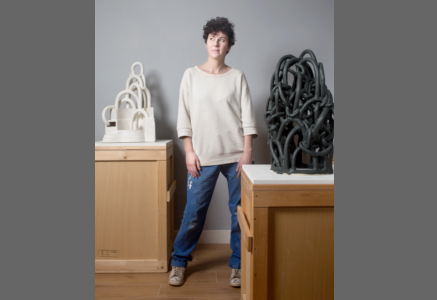Clémentine Dupré
10
Porträt. Photo Girardi Anthony
Clémentine Dupré | France | Intonation 2020
Providing an Interpretation of tangible or intangible space, experiencing our interaction with architecture and, hence, the bringing of archetypes to the fore are equally fundamental principles guiding the work of Clémentine Dupré
Several months before leaving for the Vosges where she was to take up the position of artist in residence and test mountain solitude in encounters with fire, Clémentine had enjoyed reading the French edition of Martin Gayford`s "A Bigger Message: Conversations with David Hockney". In it, the painter mentions the work of Claude Lorrain who was an emblematic landscape painter in the Baroque era. Hockney talks about the will to fit into the multiplicity of phenomena and into the flux of things in a perpetual state of becoming, by means of dynamic and open compositions that tend to dilate beyond their own limits or containment. Intuitions of light or wild landscape as being "capturable" were as yet quite foreign to Clémentine`s previous corpus which had usually been monochrome and set in a resolutely urban environment.
Is there a form of intention that shows up almost despite oneself? Building out of the void of architectural structures in harmony with natural forms will take on quite a different meaning once the door of the Anagama kiln is opened after firing. The fire`s power and violence will leave their own stigmata but there will also be biological mimesis revealing unexpected nuances of colour that echo all those mental images gathered during Clémentine`s long stay in the Vosges: the sombre density of forest, the powdery yellow of pollen, that bluey grey of rocky outcrop and peak or the orangey bite of fire. The experience turns out to be quite Baroque. It is even an experience over and beyond sculpture itself.
Providing an Interpretation of tangible or intangible space, experiencing our interaction with architecture and, hence, the bringing of archetypes to the fore are equally fundamental principles guiding the work of Clémentine Dupré
Several months before leaving for the Vosges where she was to take up the position of artist in residence and test mountain solitude in encounters with fire, Clémentine had enjoyed reading the French edition of Martin Gayford`s "A Bigger Message: Conversations with David Hockney". In it, the painter mentions the work of Claude Lorrain who was an emblematic landscape painter in the Baroque era. Hockney talks about the will to fit into the multiplicity of phenomena and into the flux of things in a perpetual state of becoming, by means of dynamic and open compositions that tend to dilate beyond their own limits or containment. Intuitions of light or wild landscape as being "capturable" were as yet quite foreign to Clémentine`s previous corpus which had usually been monochrome and set in a resolutely urban environment.
Is there a form of intention that shows up almost despite oneself? Building out of the void of architectural structures in harmony with natural forms will take on quite a different meaning once the door of the Anagama kiln is opened after firing. The fire`s power and violence will leave their own stigmata but there will also be biological mimesis revealing unexpected nuances of colour that echo all those mental images gathered during Clémentine`s long stay in the Vosges: the sombre density of forest, the powdery yellow of pollen, that bluey grey of rocky outcrop and peak or the orangey bite of fire. The experience turns out to be quite Baroque. It is even an experience over and beyond sculpture itself.












